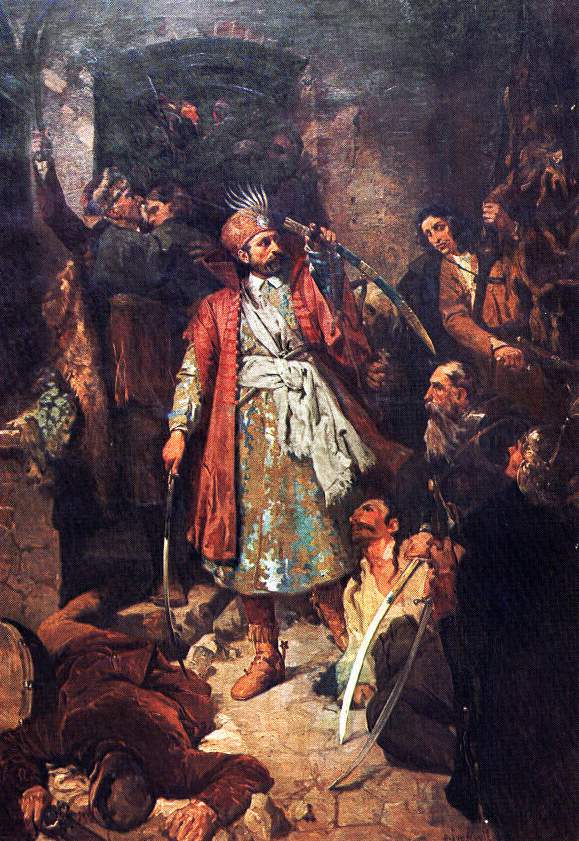Change language:
The Siege of Szigetvár, aka ’the battle that saved civilization’

Forty years after the legendary Battle of Mohács, another event of high importance in the fight against the Ottoman Empire took place, the Siege of Szigetvár. The Hungarian and Croatian forces united under the command of Nikola Zrinski (Miklós Zrínyi, as Hungarians know him) stopped the Ottomans who were on their way to siege Vienna.
The siege of Szigetvár took place when the Ottoman Army led by the 72-years-old Suleiman was advancing towards Vienna in 1566. The Ottoman forces were stopped by a small army assembled by a Croatian -Hungarian nobleman and general, Nicola Zrinski, at Szigetvár. Suleiman’s intention was to punish Zrinski for his victory over a Turkish encampment near Siklós and then march on to Vienna, but he got more than he bargained for: his quick endeavour took him a month and even his life.
The Ottomans arrived near Szigetvár on the 6th of August, and after realising that they are not able to break down the walls protecting the city due to the moors and the gutter that surrounded it, they began draining these on the 12th of August. Three days later the first clash between the Hungarian-Croatian defenders and the attackers took place, though it was an Ottoman victory. It did not take the Ottomans long to tear down the walls of the fortress, but even though they broke down the city walls by August 19, the castle itself still stood.
Mysteriously, on the 40th anniversary of the Hungarian success at the Battle of Mohács, Zrinski’s forces were able to gain victory over the Ottomans on the 29th of August.
The siege lasted for exactly a month, from August 6 until September 6. The final battle, when the Ottomans destroyed the walls surrounding the castle, took place on the 7th of September, a day after Suleiman died. The sultan’s demise was, however, kept secret from the army in fear of disillusionment. According to historians, this secret was guarded by the late sultan’s inner circle for 48 days.

source: WikiCommons
The most heroic and interesting part of the siege is the final battle. Once the Ottomans broke into the remains of the city, Zrinski ordered his men to fling open the castle’s gates, and the moment the Ottomans entered the castle, the defenders fired a mortar filled with broken iron, killing 600 Ottomans.
After this, Zrinski charged with his remaining 600 men out into to the battlefield, to confront the massive Ottoman army, where he eventually died from an arrow to the head but suffered two musket wounds to the chest too.
However, the Croatian general had still another surprise for the Ottomans.
He had the castle’s powder magazine blown up when the enemy troops charged through the castle’s remains, laying even more waste to the Ottoman Army.
Tragically, Zrinski’s garrison consisting of 2300 men was almost wiped out, receiving no help from the Imperial Army. The Ottoman forces were standing at 150 thousand men at the beginning of the siege, and around 20-35 thousand of them were killed in battle.
So, why is this the ‘battle that saved civilisation’ if it was a tragic loss and the ethnic Hungarians suffered a lot as a result? This title was used by a French clergyman and statesman, Cardinal Richelieu, highlighting the fact that if it were not for Zrinski and his troops, the Ottoman Army would have taken Vienna in the summer of 1566. Thanks to the prolonged resistance and the heavy casualties on the Ottoman side, especially the death of Suleiman, the Ottomans lost their opportunity to launch an attack on Vienna for another 120 years.
The battle at Szigetvár is still especially important for Hungarian literature, as it has inspired the most well-known epic poem in the history of Hungarian literature, Szigeti veszedelem (The Siege of Sziget), written by Zrinski’s great-grandson, bearing the same name as the general. British art historian Kenneth Clark describes The Siege of Sziget as one of the major literary achievements of the 17th century.
featured image: Johann Peter Krafft: Nikola Šubić Zrinski’s Charge from the Fortress of Szigetvár – Wikicommons
Source: Daily News Hungary







